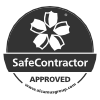Matt Booth is an instrumentation maintenance technician at Severn Trent Services, working in the mechanical, electrical, instrumentation control, and automation (MEICA) team.
He’s been with Severn Trent Services since 2021, lives in Halesowen, and outside of work, loves to ride his bike to the nearby velodrome, where he also coaches sessions for other cyclists.
We spoke to him about his role and how he and his colleague, Ash Adam, are helping to transform how water and wastewater assets are managed going forward.
My job involves looking after the devices that measure, monitor, and control the processes that treat, supply, and distribute water to customers.
Behind almost every water and wastewater asset – particularly more complicated ones – is some form of control and automation with instruments recording data. A specific piece of equipment at the forefront of what we do is a PLC (Programmable Logic Controller). Simply put, this is a computer that acts as the ‘brain’ that runs the whole process.
To do my job, you’ve got to have a good grasp of water industry processes and be a bit of a software programmer, too!
Ash and I worked on a project to fix an old, failing chlorination system.
Two dosing pumps distributed chlorine from a small tank into a water tower to ensure good-quality water that was safe to drink. One of those dosing pumps had failed. So, while the other pump kicked in to compensate, the asset wouldn’t be able to last forever with one pump down. Think of it like breaking a leg. You can still get around, but it’s much more complicated when one leg’s broken!
Our job was to get to the bottom of the failure and fix it before it became a problem.
The two dosing pumps were controlled by a PLC that sends messages to the pumps and tells them what to do.
The PLC was malfunctioning and needed to be reprogrammed to work again.
At first, it was a real struggle because we didn’t have the code to get inside the PLC to find out what was happening. A third party controlled this, and it was proving too difficult to get access.
However, after liaising with the manufacturer of the PLC, we managed to procure new technology so we could go in and reprogramme the PLC so the faulty dosing pump would work again.
We’ve since upgraded all PLCs across the customer site, giving us complete control of the assets, meaning we can monitor and repair them in-house without relying on a third party.
The new PLCs are future-proofed and can integrate with the latest telemetry units so we can gather and analyse real-time data. They can potentially talk to smartphones for remote access, too.
However, having complete control over the PLCs is the most significant benefit, as relying on third parties can be time-consuming and costly. It also means our customers enjoy peace of mind that we have the in-house technical expertise to manage and maintain the water and wastewater assets they entrust us to care for.
There are plenty of things, and there are loads of opportunities in front of us to exploit technology to transform how water and wastewater assets are managed in the future. It’s just about picking the right ones for our customers. For example, remotely managing things like PLCs is an exciting way to run more efficiently and sustainably.
At Severn Trent Services, I have the freedom to find new ways of working and see innovative projects through from start to finish.
I also have a great partner in crime at work named Ash, who has over 30 years of experience in the water industry. Together, we form a great team!
Severn Trent Services offers nationwide water and wastewater asset management services for private networks. For more information, please visit https://www.stservices.co.uk/commercial-water-services/









